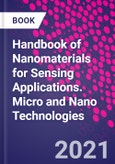Handbook of Nanomaterials for Intelligent Sensing Applications provides insights into the production of nanosensors and their applications. The book takes an interdisciplinary approach, showing how nano-enhanced sensing technology is being used in a variety of industry sectors and addressing related challenges surrounding the production, fabrication and application of nanomaterials-based sensors at both experimental and theoretical levels. This book is an important reference source for materials scientists and engineers who want to learn more about how nanomaterials are being used to enhance sensing products and devices for a variety of industry sectors.
The pof miniaturized device components and engineering systems of micro- and nanoscale is beyond the capability of conventional machine tools. The production of intelligent sensors at nanometer scale presents great challenges to engineers in design and manufacture. The manufacturing of nano-scaled devices and components involves isolation, transportation and re-assembly of atoms and molecules. This nanomachining technology involves not only physical-chemical processes as in the case of microfabrication, but it also involves application and integration of the principles of molecular biology.
Please Note: This is an On Demand product, delivery may take up to 11 working days after payment has been received.
Table of Contents
1. Intelligent Sensor- Perspective2. Intelligent Sensor- Nano Candidates3. Nanofabrication Techniques-Biosensors4. Nano Fabrication Techniques-Chemical Sensors5. Nanofabrication Techniques-Physical Sensors6. Intelligent Nano Sensors (INS)- Environmental Applications7. Intelligent Nano Sensors (INS) - Energy Applications8. Intelligent Nano Sensors (INS) - Electronics Applications9. Intelligent Nano Sensors (INS) - Medical/Bio Applications10. Intelligent Nano Sensors (INS) -Emerging Application11. Intelligent Nano Sensors (INS) - laboratory Synthesis to Commercial Applications12. Intelligent Nano Sensors (INS) - Safety Risk and Socio Economics13. Intelligent Nano Sensors (INS) - Green and Sustainable future and ConclusionsAuthors
Suresh Kumar Kailasa Associate Professor, Department of Applied Chemistry, S.V. National Institute of Technology, Surat, India. Suresh Kumar Kailasa FRSC is an Associate Professor of the Department of Chemistry at Sardar Vallabhbhai National Institute of Technology (SVNIT) Surat, Gujrat, India. He obtained his master of science (Chemistry of Natural Products) in chemistry from Sri Krishnadeveraya University, Andhra Pradesh, India and his PhD in Chemistry from Sri Venkateswara University, Tirupati, Andhra Pradesh, India. After completing two Postdoctoral Fellowships at Chonbuk University, South Korea and at National Sun Yat-Sen University, Taiwan, he joined an Assistant Professor at SVNIT, Surat in 2009. He received Young Scientist Award from Taiwan Mass Spectrometry Society in 2013. He was selected as a Brain Pool Scientist at the Department of Chemistry, Chung-Ang University, South Korea under Korean Brain Pool Invitation Program of KOFST in 2017. He was selected as a Fellow of the Royal Society of Chemistry (FRSC), London, UK and Fellow of the Society of Pesticide Science India in 2019. He has been selected as a life member in the National Academy of Sciences (NASI) Allahabad, India. He acted as Guest Editors in the special issues in Applied Sciences (MDPI) and Materials Today Chemistry (Elsevier). Currently, he is the head of the Department of Chemistry, SVNIT, Surat, India. He is the author of 182 peer-reviewed papers and is the co-inventor of a Taiwan Patent. His research interest in the field of analytical chemistry, MALDI-MS, ESI-MS, microextraction, nanosensors, drug delivery, surface modifications of nanostructure materials, functional nanomaterials for the development of new analytical strategies. Chaudhery Mustansar Hussain Adjunct Professor & Director of Laboratories, New Jersey Institute of Technology (NJIT), Newark, NJ, USA.Chaudhery Mustansar Hussain is an Adjunct Professor and Director of Laboratories at the New Jersey Institute of Technology (NJIT), Newark, NJ, USA. His research focuses on the applications of nanotechnology and advanced materials, environmental management, analytical chemistry, and other various industries. He is a prolific author and editor for Elsevier, the American Chemical Society, the Royal Society of Chemistry, John Wiley & Sons, CRC Press, and Springer.








